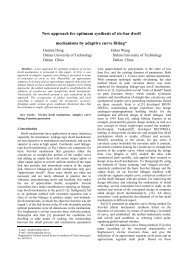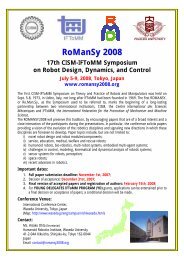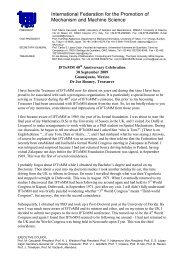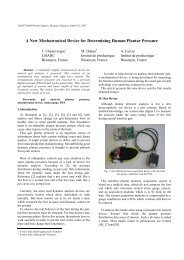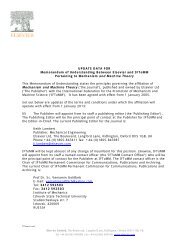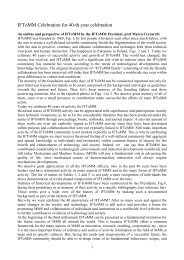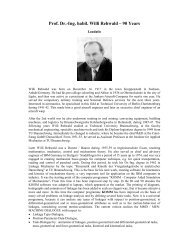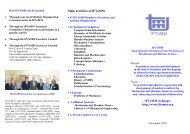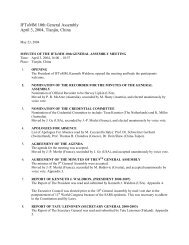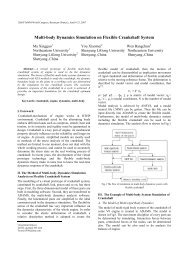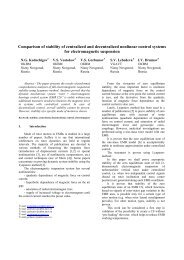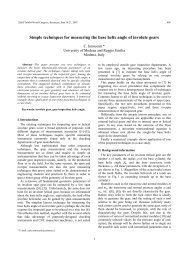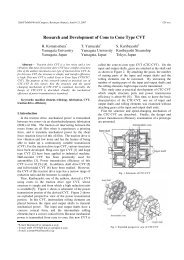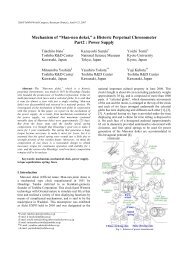Message from Professor Erskine Crossley, Founder - IFToMM
Message from Professor Erskine Crossley, Founder - IFToMM
Message from Professor Erskine Crossley, Founder - IFToMM
You also want an ePaper? Increase the reach of your titles
YUMPU automatically turns print PDFs into web optimized ePapers that Google loves.
In the beginning, …<br />
Dr. F. R. <strong>Erskine</strong> <strong>Crossley</strong>, <strong>Professor</strong> Emeritus<br />
Today, I would like to tell you the story about the beginning of the International<br />
Federation for the Theory of Machines and Mechanisms (<strong>IFToMM</strong>). <strong>IFToMM</strong> did not<br />
spring – fully clothed – <strong>from</strong> the 1969 Assembly at Zakopane, as many believe. The real<br />
beginning – the spark of conception, if you will – occurred in Sukhumi, Soviet Georgia,<br />
in October 1967.<br />
Sukhumi, Soviet Georgia<br />
In the Soviet Union, Ivan Ivanovich Artobolevskii was an engineering professor and an<br />
Academician, and also a member of the Supreme Soviet (that is, the governing body of<br />
the whole Soviet Union).<br />
In 1967, he organized a seminar meeting for all Soviet<br />
engineering professors specializing in Mechanisms, to be held at Sukhumi, that October.<br />
A small number of professors, also specializing in Mechanisms, <strong>from</strong> outside of the<br />
Soviet Union, were also invited. <strong>Professor</strong>s Meyer zur Capellen (Aachen TH, West<br />
Germany), George Sandor (Yale University, USA), den Hartog (M.I.T, USA), and I all<br />
received invitations. I decided to go and den Hartog sent <strong>Professor</strong> Adams in his place.<br />
My wife and I arrived in Sukhumi on the eastern shore of the Black Sea, on the first day<br />
of that conference. I hurried in to attend the opening session, but every speech was in<br />
Russian, which I do not understand at all. By lunchtime, I was disappointed, but went to<br />
rejoin my wife and have lunch at our hotel. Several small tables in the dining room there
carried small national flags; I immediately saw a West German flag and our USA “stars<br />
and stripes,” so it was clear they wanted to govern where we would sit. Probably, I<br />
suspect, because there was a microphone hidden under each table, connected through to a<br />
translator, out of sight, in the next room. This is what it was like in the Cold War days.<br />
At the West German table sat <strong>Professor</strong> and Mrs. Meyer zur Capellen, good friends of<br />
ours <strong>from</strong> Aachen. We greeted them and sat down with them, but at once, a waitress<br />
came over and directed us to go to the US table. Instead, I went over, grabbed the<br />
American flag there, and carried it back to the German table.<br />
There was a quick<br />
conversation between waitresses, but no complaint; I knew I had won with the two flags,<br />
and I knew that the hidden translators had acquiesced. Both my wife and I spoke<br />
German, so all was well.<br />
After our meal, a messenger came to invite us to meet our chairman, <strong>Professor</strong><br />
Academician Artobolevskii, who quickly told me of his desire to create a worldwide<br />
societyassociation for research into the Theory of Machines and Mechanisms (TMM). I<br />
told him I was already appointed chairman of the next ASME conference on Mechanisms<br />
to be held in October 1968, and that one reason I had come to Sukhumi was to invite<br />
Soviet professors to attend. He proposed that we jointly form a worldwide federation and<br />
we could work together. I agreed enthusiastically. Our translator in all this conversation<br />
was <strong>Professor</strong> Aron Kobrinski, who spoke fluent English.<br />
Having jointly agreed on a goal, Academician Artobolevskii invited my wife and me to<br />
accompany him and his wife to the state opera the next night. We did, and it was a grand<br />
performance of Don Quixote. An old gentleman, apparently president of the Opera
House, came over during the intermission and took us on a tour of the museum, full of<br />
many treasures like the slippers of a renowned ballet dancer.<br />
The next day we continued our discussions, with <strong>Professor</strong> Kobrinski again translating.<br />
Artobolevskii stated his belief that this new worldwide society would need a governing<br />
constitution, and asked me if I would write this. By chance, at home, I had just finished<br />
writing a zoning ordinance for a new subdivision in our village, so with confidence I<br />
offered to undertake this legal task. We went on to discuss staff officers, especially the<br />
need for a secretarygeneral for correspondence and the collection of dues, also a<br />
treasurer to hold the dues and keep a budget.<br />
Artobolevskii then expressed his hope for the two of us to meet in USA, and he proposed<br />
his plan for an international organization with joint meetings, though he was having<br />
difficulty deciding on an initial title. “How could you pronounce “IFTMM?”” he asked<br />
me.<br />
I immediately suggested including an “o” and pronouncing it “<strong>IFToMM</strong>.”<br />
Artobolevskii accepted my idea and went on to suggest that four or five Russians could<br />
attend the next ASME meeting in Atlanta, which delighted me. (This never came to pass,<br />
because I did not know the US State Department procedures, and the US State<br />
Department would not approve the issuance of so many visas to Soviet citizens. We were<br />
able to have Bessonov come, which did much to deepen our friendly relationship.)<br />
On the fourth day of the allSoviet conference, Artobolevskii threw an evening party at<br />
his dacha for the heads of each national delegation, with their wives, on a promontory of<br />
land in front of his villa. It was a most beautiful spot: the view was out over the Black<br />
Sea at sundown. There was a very long table, set for delegates <strong>from</strong> Hungary, Romania,<br />
Bulgaria, Georgia and so on, each man with his wife, and also for Artobolevskii’s staff
helpers such as <strong>Professor</strong>s Kobrinski, Bessonov, and (the Romanian) Bogdan. Then also,<br />
there were several Polish professors and their wives, and finally myself with my wife,<br />
May. Each place was laid with two cutcrystal wine glasses and a short vodka glass,<br />
beside small bottles of red wine, making the table sparkle in the setting sun. It was really<br />
splendid. A plentiful staff was busy serving everyone with fish or salad plus one of<br />
several small roast piglets. <strong>Professor</strong> Kobrinski was again sitting next to me, so that I had<br />
no trouble following the series of toasts. My wife, sitting beside me, had <strong>Professor</strong><br />
Bessonov, who also spoke good English, on her other side.<br />
Artobolevskii himself was the “tamidan” – the chief proposer of toasts. We all began to<br />
call him Ivan Ivanovich. I discovered the smaller wine glasses were always full of vodka<br />
or brandy. The whole Polish contingent called for a toast to Poland, then another to all<br />
the women of Poland. I noted that Artobolevskii was edging nearer to me, so I knew my<br />
turn would be next to make a toast; however, it was he that proposed a toast to the U.S.<br />
President. Then the game changed: Ivan Ivanovich came forward with two hollowed out<br />
ram’s horns to replace the glasses – each could hold a whole bottle of wine. Furthermore,<br />
neither horn could be set down, for they would roll over and spill their contents.<br />
Artobolevskii kept proposing some other toast. Normally I drink nothing, but this was a<br />
friendly competition, and a way for us all to become closer.<br />
The actual founding of the federation would be achieved at a conference in 1969 at a ski<br />
resort in Zakopane in the mountains of south Poland. A Polish organizing committee<br />
under <strong>Professor</strong> Jan Oderfeld of Warsaw Polytechnic was already on the job.<br />
We<br />
however would also need a subcommittee to approve the proposed constitution. This<br />
would take place at Varna, a seaside resort in Bulgaria, several months ahead of the
major conference at Zakopane, under the leadership of the proposed secretarygeneral,<br />
<strong>Professor</strong> Konstantinov, of Sofia. It was easy for me to agree to all this, but I had a big<br />
task! I had only months to compose an acceptable constitution.<br />
Varna, Bulgaria<br />
During the following months, I was busy writing a draft constitution. The U.S. Academy<br />
of Sciences in Washington, USA was most helpful in providing me examples <strong>from</strong><br />
similar organizations, so I had good materials to work <strong>from</strong>. In addition, on the issue of<br />
fees, there would need to be a ladder of dues for different sizes of nation, the bigger<br />
nations paying more. Much of this plan came <strong>from</strong> the meetings of a committee of<br />
Soviet countries that had been planned earlier.<br />
For the meeting at Varna, Bulgaria, held July 24, 1969, delegates <strong>from</strong> additional<br />
countries had been added. We now had delegates <strong>from</strong> Sweden, Holland, and France.<br />
On the first day, the draft constitution I had created was presented to the delegates.<br />
However, this meeting was not without some drama, for, at this point, the Russians<br />
proposed their own constitution. With only one more day to get approval, the question<br />
was: what to do? So, after supper, Konstantinov and I sat down to rewrite my draft<br />
constitution to accommodate the unexpected Russian proposal. We worked until 3 a.m.<br />
the next morning to reach an acceptable version. Then Konstantinov woke up his<br />
secretary, who retyped the whole document and made copies for all the delegates – all in<br />
time for the 10 a.m. session. This version of the proposed constitution was finally<br />
approved, as well as the list of proposed officers. Off to Zakopane!
Zakopane, Poland<br />
This very large assembly was very well run by the Polish subcommittee, lead by<br />
<strong>Professor</strong> Jan Oderfeld of the Warsaw Polytechnic Institute. The countries represented<br />
had continued to expand, with new delegates <strong>from</strong> Japan and Canada, for example. At<br />
this assembly, the delegates approved the proposed constitution, as written by <strong>Professor</strong><br />
<strong>Crossley</strong>, and the proposed slate of officers was elected to fouryear terms of office as<br />
follows:<br />
President – Artobolevskii (Soviet Union)<br />
Vice President – <strong>Crossley</strong> (USA)<br />
Secretary General – Konstantinov (Bulgaria)<br />
Thus was <strong>IFToMM</strong> born!<br />
August 12, 2009<br />
Da: Michael F E <strong>Crossley</strong> [mailto:michael_crossley@hotmail.com]



